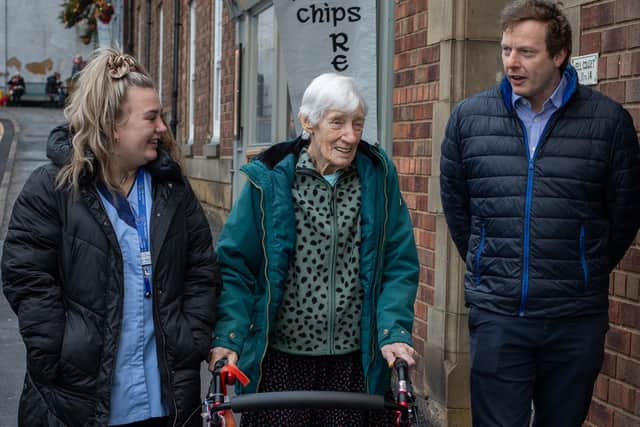Whitby Harbour trip with fish and chips unlocks memories for Mayfield Care Home resident
Marjory Hart is sitting on her favourite bench, overlooking Whitby Harbour, eating fish and chips and commenting on the ships, the birds and the fresh air. It’s a chilly day, but the sun is valiantly pushing through the clouds. Marj, as she is known, doesn’t care about the weather; she has a big smile on her face. “This is my favourite place,” she says.
Not so unusual, perhaps - but it’s five years since Marj has done this, and most of the time, she doesn’t know what day it is or where she is, let alone be able to remember a familiar sight.
Advertisement
Hide AdAdvertisement
Hide AdMarj, who is a sprightly 90, has dementia, and very limited short-term memory.


She doesn’t know where her room is, can’t recall the way to the loo and doesn’t even remember her husband.
The only thing she knows, say carers at The Mayfield Care Home where she now lives, is that Whitby is the best place in the world, and she has children who love her.
Her long-term recall, however, is generally excellent - put on an old Nat King Cole song, and she knows all the words.
Advertisement
Hide AdAdvertisement
Hide AdWhich is why, when The Mayfield cooked up the scheme to take Marj back to her favourite bench, it brings back such memories.


On a trip around town, Marj remembered her old house, the ships in the harbour, the harbour bridge, the fish and chip shop on the corner and the birds playing on the harbour wall.
All is familiar, and delightful. Marj moved into The Mayfield last April, but has lived in Whitby for many years, bar a short stint in Witney, Oxfordshire, where she originally lived after her dementia diagnosis to be near her children.
Whitby, she says, is her home. “I’m Yorkshire through and through,” she says with a grin.
Advertisement
Hide AdAdvertisement
Hide Ad“Cut my head off and I’d have ‘Yorkshire’ written inside me.”


Marj was born in Aberdeen, the daughter of Ethel Paul and John Campbell.
The family left Aberdeen when Marj was just a few months old and moved to Foundry Avenue in Leeds, where, in 1957, she met her husband Peter, who was in the RAF.
The pair spent the majority of their married life travelling the world, living in Germany, Singapore, Wales and multiple locations across England.
Advertisement
Hide AdAdvertisement
Hide AdWhen Peter retired in 1983, the couple bought a home in Caterton, Oxfordshire, but Marj still hankered for the north. Eventually, Peter agreed to move to Yorkshire - although wanted the country, not the coast.
Eventually, Marj got her way, and the couple moved to Church Street in Whitby.
From there, Marj would walk every day to Mister Chips to buy fish, chips and a cup of tea, which she would take to a bench overlooking the harbour.
Advertisement
Hide AdAdvertisement
Hide AdFive or six years ago, however, Marj started to develop signs of dementia: losing money; putting the kettle in her bedroom.
Now, her life revolves largely around The Mayfield, where she is able to live a relatively independent life within its safety, taking part in Tai Chi and armchair exercises; singing along to Nat King Cole in the afternoons.
The trip into Whitby, however - the idea of Tobyn Dickinson, CEO of The Mayfield - seemed to unlock something in Marj.
This is not uncommon: reminiscence is a powerful tool when it comes to improving the life of someone with dementia.
Advertisement
Hide AdAdvertisement
Hide Ad“Triggering or prompting happy memories from a person’s life can help their overall mood and wellbeing, as well as strengthen their sense of identity,” says Angelo Makri, senior knowledge officer at the Alzheimer’s Society.
Since 1990, its supporters' donations have allowed the charity to invest more than £80m into dementia research.
That includes funding more than 400 research projects, which it says have made a real impact to both the dementia research field and people affected by syndrome.
At least 70 per cent of all people living in care homes have dementia, according to Alzheimer’s Society.
Advertisement
Hide AdAdvertisement
Hide AdResearch also shows, though, that events and facts that are most frequently retrieved and used over a lifetime - like a daily trip to the fish and chip shop, for example - are better recalled by those with Alzheimer’s in later life.
“We told her before where she was going and then she kept saying ‘we’re going to my favourite place’”, says Tobyn.
“When we took her down, her face lit up as soon as she got out of the taxi. She knew exactly where she was.”
As well as the bench, Marj was taken to her old home, and met some of her former neighbours, who reminded her how they had helped her - especially when it came to fixing her TV.
Advertisement
Hide AdAdvertisement
Hide AdThe visit jogged all sorts of memories, from the views from front and back, to the old salt bin used to grit paths in the winter.
Marj recalled Whitby’s Regatta - her favourite time of year - her favourite local shops (she knew all the shopkeepers) and the best pubs, including the Endeavour which was right next door to her house.
“I used to love watching all the parades,” she recalls, “and the rowing races and Red Arrows.”
The day is likely to have long and positive repercussions for Marj. As Makri explains, “even after the memory of a happy experience is forgotten, the emotional response can still be there.
Advertisement
Hide AdAdvertisement
Hide Ad"So re-experiencing a pleasant event and feeling the positive emotions associated with it may help the person’s mood for some time.”
Certainly, back on her bench, the benefits of the trip are clear.
“This is fantastic,” she says with a smile. “This has been one of the best days of my life.”
Comment Guidelines
National World encourages reader discussion on our stories. User feedback, insights and back-and-forth exchanges add a rich layer of context to reporting. Please review our Community Guidelines before commenting.